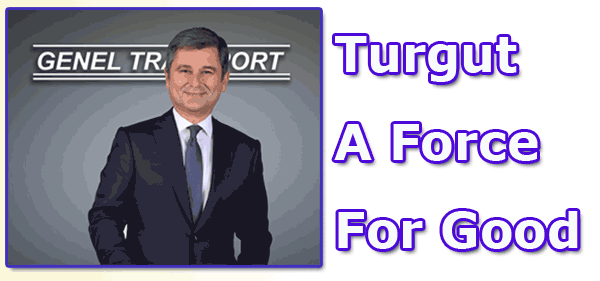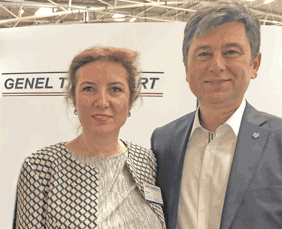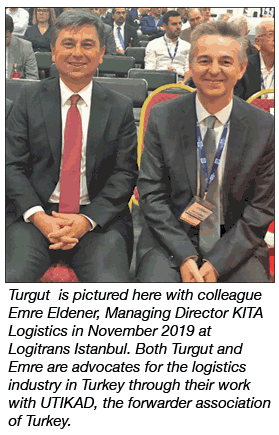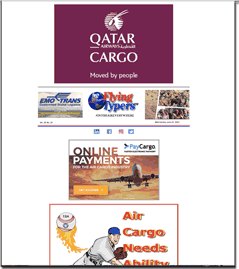 |
In early July as FIATA, the largest organized
air freight forwarder organization in the world announced a major deal
with PayCargo, I began thinking about the forces that are moving that
organization forward in 2021 and Turgut Erkeskin of Istanbul came to mind.
FIATA has some very fine people in its leadership
group as that 95-year young organization continues its march through the
pandemic and other challenges facing us all, with calm and reason and
innovation.
As example, right now whilst others may
be talking about it, FIATA supports the best young people’s educational
outreach in transportation.
As mentioned, FIATA is also driving that
landmark arrangement with PayCargo that offers a new deal for the global
forwarding industry.
On another front, sadly the hoped for cargo
cooperation with IATA for now is toast.
But hope runs high amongst forwarders and
others that maybe when and if IATA gets its air cargo act together, (after
all the layoffs, retirements and consolidations at that agency) as things
get back to normal, the global airline organization might eventually see
its way toward more cooperative thinking.
I can tell you, having delivered the keynote
address at the signing of the IATA/FIATA accord at Dublin in 2016, hopes
ran high on both sides for a step change in the airline and forwarder
relationship.
Now in 2021, at least at FIATA, they still
do.
A part of all of this, as a member of the
FIATA Board of Directors, is Turgut Erkeskin, a seasoned, yet youthful,
energetic and quietly confident presence.
But make no mistake about it he is all there,
albeit just below the radar, a most interesting transportation executive
from Istanbul.
Turgut doesn’t shout for attention.
In fact, a major force in Turkish cargo
as a long time shaker and mover of UTIKAD, the high-energy forwarder association
of Turkey, Turgut is best known and respected as a reasoned consensus
guy.
Perhaps the key quality about Turgut when
you talk to him, is that he actually listens, and is able to pivot and
broaden his thinking to move things forward.
Turket Erkeskin, as the pandemic finally
begins to subside in 2021, emerges as an enlightened force for good in
transportation and increasingly FIATA’s man for all seasons.
Here Marco Sorgetti and Turgut talk about
life and business and what lies ahead.
GDA
Expecting The Unexpected
My hectic visit to the last FIATA Headquarters
Sessions in Zurich in 2019 came to mind by contrast during the last flawless
Zoom FIATA General Meeting. I was thinking of my old friends, trying to
figure out how their life had changed due to the pandemic, looking at
their small faces on the screen, more importantly how the younger ones
among them looked at their future after this unexpected crucial experience.
 Turgut
Erkeskin was one of the first ones to emerge from the group. When I met
him first, he was relatively new in the FIATA Presidency, even though
his international experience was as good as gold. Here is a man born in
Turkey in 1964, who finished Sisli Terakki High School in 1980, graduated
from Istanbul University Faculty of Economics in 1984, then continued
his education abroad to improve his command of foreign languages. Turgut
Erkeskin was one of the first ones to emerge from the group. When I met
him first, he was relatively new in the FIATA Presidency, even though
his international experience was as good as gold. Here is a man born in
Turkey in 1964, who finished Sisli Terakki High School in 1980, graduated
from Istanbul University Faculty of Economics in 1984, then continued
his education abroad to improve his command of foreign languages.
In 1985 he joined a leading maritime enterprise
active both sides of the Bosporus and in 1988 opened his own company in
Istanbul.
He married Elif, the inspiring elegance
of his life, mother of two, who is now Vice President in his company,
with responsibilities in Sales and Marketing.
I asked Turgut whether he would have time
for some questions, he replied to me with his gentlemanly nod and here
we go . . .
FT: Turgut, I am so glad to talk to you again.
How is your business in this period? How did 2020 change your business
life? I guess Istanbul, which is the largest European city, always so
active and joyful, must have suffered enormously for the safety measures
imposed on the people by the pandemic, correct?
TE:
The pandemic was a big shock for all of us. It was not
too long to understand the negative impact on our business and social
life. At 24 I created Genel Transport (www.geneltransport.com.tr)
and the expansion has been rapid and continuous in these years. We deal
with aerospace, healthcare, life science, chemicals, live animals, heavy
lift and project cargo.
The pandemic severely disrupted production, consumption,
and even behavioural habits. We had to develop a systematic understanding
of changing habits of both our clients and personnel. The very first thing
we have realised was that the pandemic had accelerated the existing trends
rather than changing them. Things that we expected to happen in about
5 to 10 years have become today’s reality.
Take e-commerce. It wasn’t something new,
but the demand, the volume has increased exponentially. Digitisation of
work-flows is the new normal. We were probably expecting this to happen
in the near future, but it is happening just now on a greater scale than
we imagined. In any case, other than e-commerce, life science and, to
a certain extent, chemicals the rest of the business has decreased as
in other countries, even though Turkey was not among the hardest hit,
if we consider its population (82 millions).
As you know I live and work in Istanbul, I am
now 56, so my perception of the city spans several decades. As you say
Istanbul shines in a restrained light in these days and people have become
wary of their ways, even if we did not have to shut the shop completely
as others had to do. I must say I miss the frenzy and the surprise that
Istanbul so abundantly possesses.
FT: And
the food… I think Istanbul has among the best food in the world.
When was the last time you dined with a good friend or a business colleague
on the Bosporus, as we did once?
TE:
You might be surprised but it was not so long ago. You
surely remember: it was the Poseidon, the same place that we went to together.
Facing the sea, in the open air, so we had no trouble to observe the safe-distance
measures. In this season the weather is no longer so good to have dinner
outside, so we are a bit more confined. The best we can do is to take
our drinks at hand and meet online. It is still fine with your friends,
but formal meetings at an online platform are not what you are really
looking for. I am waiting for the season to change and we shall be back
there and enjoy the food and the view.
FT: What
aside from COVID-19 do you think 2020 will be remembered for?
TE:
I daresay 2020 was not a year of great happiness. Aside
from COVID, we have had some other controversies, damages and turbulence:
Black Lives Matter, bushfires in Australia, West Coast fires in the USA
and the explosion at Beirut Port.
I could continue… but in the end what matters most is the way we
stood up against COVID19 and the spectacular speed at which modern science
has managed to produce vaccines. This is a great achievement. Let me just
mention that Biontech has roots fromTurkey . . . No intentions
to claim anything, but I could not repress the pride in this case.
FT: What
are the lessons of 2020, what have you learned?
TE:
The most important lesson was the fact that health is
really wealth. Not only physical but also our mental health is important.
I am in admiration of how limited the damage is, even though humanity
has been affected by a really serious pandemic, one we had not seen for
over 100 years. This makes me confident in the future, I am sure many
have learnt a precious lesson and the young will be stronger.
FT: What
in 2020 and 2021 is the price tag of success?
TE:
We all want to succeed. Success needs your commitment,
your hard work, lifetime learning, and sacrifice. These were/are/will
be the price tag for success under any circumstances. COVID19 may have
created many changes, but it has no effect on these basics that everyone
should bear in mind.
FT: What
in your work routine has changed?
TE:
No doubt 2020 was indeed a difficult year to find your
work/life balance. All our routines from before the pandemic have changed.
We have extended our workday. We found ourselves 7/24 online and dealing
with the day to day operations, solving complex challenges from a distance,
in video meetings, team-building events, etc. At the beginning of the
lockdowns, it was something inevitable, as we were not ready to have almost
all our staff working remotely, yet have them all performing as one team.
Today we are much better, with the experience gained over time. Probably
we will have to find a new balance. Personally, I will try to go offline
after normal working hours, have weekends for myself and my family, learn
something new, probably learn some coding and plan some of my time for
self-development.
FT: Do
you see accelerated benefit to IT as the result of the 2020 experience?
TE:
The Pandemic is bad. But it brought a great opportunity
to entirely reconsider how we do our jobs and how we run our companies.
I believe IT is and will be an integral part of all that we do. We should
relentlessly work on digitising every process in the management of our
businesses. Technology is the necessary enabler of the virtual work environment.
Almost all data is now saved on the cloud, access is designed according
to individual requirements and apps allow virtual collaboration. The technology
is there, we need out habits to follow and adapt. It is a learning curve,
but we shall make it.
 FT:
Will there be less or more emphasis on trade shows and
group gatherings ahead in your view? FT:
Will there be less or more emphasis on trade shows and
group gatherings ahead in your view?
TE:
Trade shows are a must in every business and industry.
We cannot think of development / knowledge sharing / learning / networking
without them. I do not see any less emphasis in future, but the structure
or the configuration of those gatherings will most likely change. Even
under today's conditions, where we cannot travel, we desperately need
to attend such events, even if these are just substitutes: they are all
made on online platforms. Tomorrow we will have to accommodate both physical
and online gatherings within the same event. We all know that COVID will
not disappear overnight and some people will still choose not to travel,
so we must accommodate for their presence in different ways. Besides,
we have learned that some expectations can be amply satisfied by online
meetings.
FT:
Will Zoom become the new normal when you want to generate attention, hold
meetings build contact via social network?
TE:
Yes, definitely. Such meetings will help a lot. Obviously,
you need face-to-face meetings and socializing, but a quick meeting on
Zoom or similar team-work platforms would help expedite things as well.
Like we need every type of transport and there is a need for all of them,
all sort of meeting types, physical, virtual, video calls or just voice
calls will have their existence in a diverse communication system.
FT:
Will you continue working from office as before or have we like Caesar
crossed the Rubicon and from now on our way of doing business will be
different?
TE:
I think we have learned to work remotely and better identified
which tasks can be done outside of the office. Besides we have developed
many SOPs that can be fulfilled digitally. I think in the future we will
have a hybrid system that while we have some tasks still to be done in
the office environment, others will be done from a distance. Yet there
is quite a number of employees who prefer to work from home.
I was already doing so, even before COVID as I was traveling a lot and
dedicating a good part of my time to associations, both home and abroad,
as you know.
FT: Would
you share your feelings about weakness, older age and luxury?
TE:
Weakness is something temporary – should I feel
to be weak in anything, I prefer to resort to learning, developing other
skills and closing the gap. Older age – I do not know yet what it
is to be old, but being young is surely good, even when you start realizing
the passing of time accelerates. As you grow older, if you are not unlucky,
you also become more affluent, but today the biggest luxury is having
your family around and enjoying their company in good health. I am very
fortunate on both sides and grateful for my lot.
|




